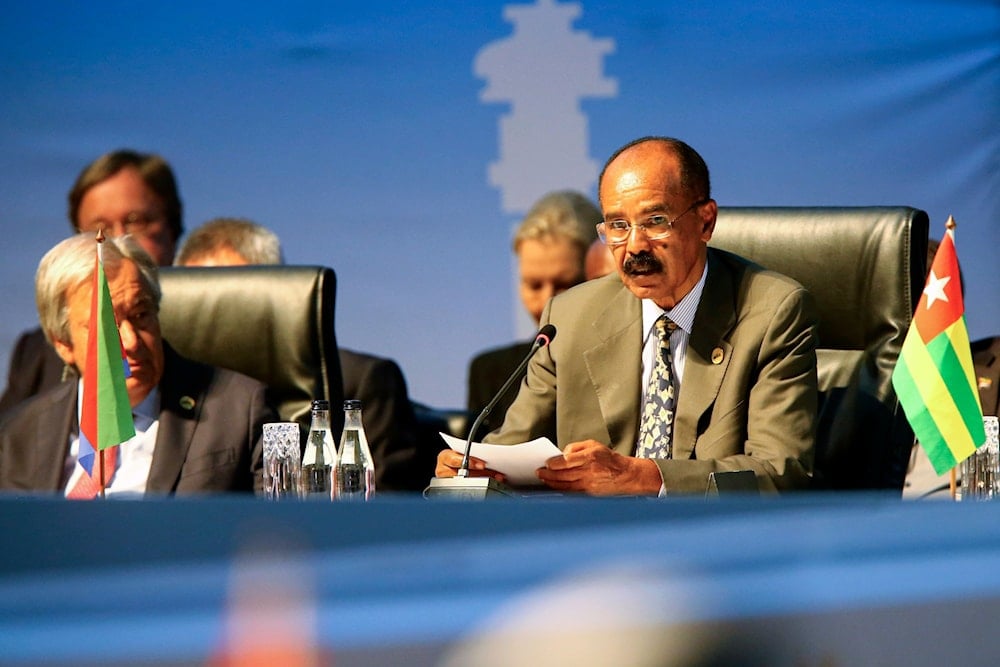Eritrea issues stark warning to Ethiopia over seaport ambitions
The Horn of Africa faces renewed instability as Ethiopia's quest for Red Sea access clashes with Eritrean sovereignty concerns, threatening to reignite conflict between the historically volatile neighbors.
-

The President of Eritrea Isaias Afwerki addresses the 15th BRICS Summit in Johannesburg, South Africa, Thursday, August 24, 2023. (Kim Ludbrook/Pool via AP)
Tensions are once again escalating in the Horn of Africa as Eritrean President Isaias Afwerki issued a direct warning to Ethiopian Prime Minister Abiy Ahmed, cautioning against launching another war. This comes amid Ethiopia’s push for sea access and worsening relations since the Tigray conflict.
In a televised address, President Afwerki warned that Ethiopia’s numerical superiority would not ensure military success, referencing the "human wave" tactics employed by Ethiopia in past wars. For reference, Ethiopia has a population of 130 million, Eritrea a mere 3.5 million.
Afwerki called Abiy’s posturing a “reckless” distraction from Ethiopia’s internal political struggles. He emphasized that Eritrea would not tolerate violations of its sovereignty and urged Ethiopia to resolve domestic issues before considering external action.
Ethiopia, the most populous landlocked country in the world, has long pursued access to the Red Sea. Eritrea, deeply wary of Ethiopia's interest in ports like Assab, sees this as a potential existential threat. Abiy Ahmed has framed maritime access as an “existential necessity,” calling Ethiopia’s landlocked status a “geographical prison”.
A history of conflict
Eritrea and Ethiopia have had strained relations since Eritrea waged a 30-year war of independence against Ethiopian rule, culminating in Eritrea's independence in 1993. Their most intense clash occurred from 1998 to 2000, when a brutal border war resulted in over 100,000 deaths. Despite a peace accord signed in 2018, trust remains fragile between the two neighbors.
The fragile peace between the neighbors disintegrated during the Tigray War (2020–2022), when Eritrean forces entered the Tigray region in northern Ethiopia to fight alongside Ethiopian troops against the Tigray People's Liberation Front (TPLF), a mutual enemy. The war was devastating, killing an estimated 600,000 people, and during the Pretoria Peace Agreement in 2022, Eritrea was excluded from the peace process and retained a military presence in Tigray, worsening bilateral ties.
Ethiopia also has a separate maritime dispute with Somalia. In January 2024, Ethiopia signed a Memorandum of Understanding (MoU) with Somaliland, securing a 50-year lease for Red Sea access near Berbera and rights to build a naval base. Somaliland, a self-declared independent state, is not internationally recognized, and Somalia considers it part of its territory.
Somalia condemned the deal as a violation of its sovereignty, expelled Ethiopia’s ambassador, and signed a defense pact with Egypt. Ethiopia’s implied recognition of Somaliland’s independence further escalated the crisis, drawing opposition from Eritrea and Djibouti. Mutual visits took place between officials from both countries, which helped de-escalate the crisis.

 3 Min Read
3 Min Read








